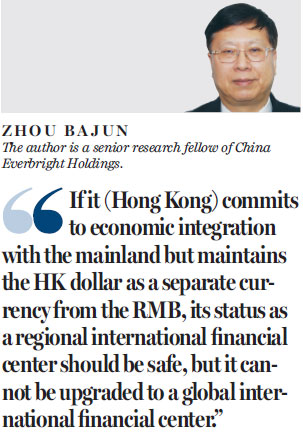RMB's SDR inclusion poses new challenges for Hong Kong
Updated: 2016-10-13 06:03
By Zhou Bajun(HK Edition)
|
|||||||||
The renminbi officially became one of the foreign reserve currencies enjoying a privilege known as Special Drawing Rights (SDR) on Oct 1. It joins the elite currency club of the US dollar, euro, Japanese yen and British sterling. Its weight ratio in the SDR is in the third place (10.92 percent), after the US dollar (41.73 percent) and euro (30.93 percent). The weight ratio of the Japanese yen was 8.33 percent, and that of the British pound was 8.09 percent.
Maybe because it had lost much of its news appeal since the International Monetary Fund (IMF) Board of Directors approved the inclusion of RMB in the SDR basket on Nov 30, 2015, or maybe because Hong Kong is wrestling with "pro-independence" problems, the local press did not pay much attention to this on National Day, despite the fact that the addition of the RMB is of profound significance to Hong Kong's status as an international financial center.
Now that the RMB is in the SDR currency basket many economies will use it in foreign trade transactions, especially with China. This will benefit Hong Kong in the sense that the SAR is the largest offshore yuan trade hub in the world. It offers an enviable opportunity for the city to elevate its status as an international financial center. However, Hong Kong will also face two unavoidable challenges as a result of the RMB joining the SDR currencies.

First, by including the RMB in the SDR basket when it is not fully convertible, the IMF is pushing China to make its currency fully convertible. This means Shanghai is very likely to become an international financial center with the RMB as the mainstay in 2020, according to the central government's plan.
Today any country or region can become a regional international financial center if its currency is fully convertible and it meets all the requirements for such a role; Hong Kong and Singapore are good examples. But a country or region can become a global international financial center only if its currency is in the SDR basket, is a foreign reserve currency and meets all the requirements for the role.
New York City and London are currently the top two global international financial centers because both the US dollar and British pound are in the SDR basket and are the most popular reserve currencies.
The euro and Japanese yen are foreign reserve currencies and in the SDR basket too, but Japan is not open enough. It missed an excellent opportunity to become a global international financial center in the 1980s when its currency was at its strongest. The European Union already had a global international financial center in London before the UK chose to leave the EU. When the UK is completely out of the EU its status as a global international financial center may crumble as its economy declines; on the other hand, the EU may very well pick another city, such as Frankfurt, to compete for the coveted status of global international financial center.
The Hong Kong dollar is fully convertible, but its own economy is not big enough to elevate its status as a regional international financial center to a global international financial center. To achieve such a giant leap Hong Kong must commit itself to economic integration with the mainland. It must become a part of the Pan-Pearl River Delta economic zone, along with Macao and nine major cities in neighboring Guangdong province. It will also have to let the HK dollar become an RMB affiliate. Without satisfying those two conditions Hong Kong's status as a regional international financial center will inevitably decline. If it commits to economic integration with the mainland but maintains the HK dollar as a separate currency from the RMB, its status as a regional international financial center should be safe, but it cannot be upgraded to a global international financial center.
Given its significance in the global economy China has what it takes to build a global international financial center by 2020, or 2030 by the latest, alongside New York City and London (or Frankfurt). Currently Hong Kong is better qualified than Shanghai for such a role.
But if it cannot become a part of the Pan-Pearl River Delta economic zone or let the HK dollar become an RMB affiliate, then Shanghai is likely to surge ahead. With the inclusion of the RMB in the SDR basket, Hong Kong can no longer ignore the formidable challenge posed by Shanghai.
The other inevitable challenge comes from the reform of the global economic governance structure, which will speed up now that the RMB has joined the SDR basket. The Chinese mainland is now the second-largest economy in the world and its contribution to the IMF has risen from sixth to third place. It will no doubt lead to more conflicts of interest between China and some Western economies, which prefer to maintain the status quo of the international political and economic order. Hong Kong may find itself caught in the crossfire.
(HK Edition 10/13/2016 page1)